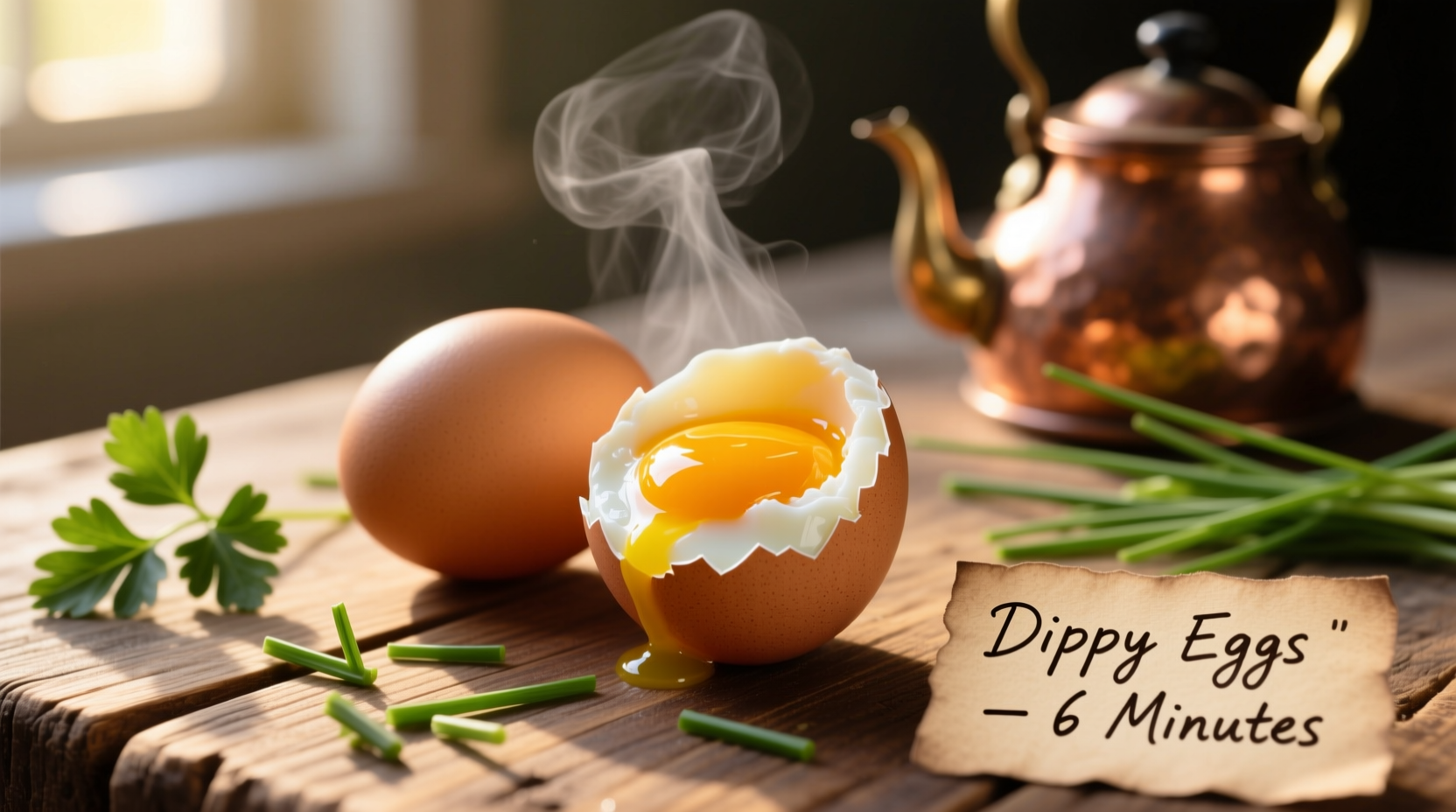The Perfect Timing Formula for Dippy Eggs
Getting dippy eggs (also called soft-boiled or runny eggs) right depends on precise timing and understanding several key variables. While the standard recommendation is 3–4 minutes for large eggs starting at room temperature, multiple factors influence your perfect cooking window.
Why Timing Matters: The Science Behind Dippy Eggs
Egg proteins coagulate at different temperatures. The white sets between 140–149°F (60–65°C), while yolks thicken between 149–158°F (65–70°C). Cooking beyond 4 minutes typically results in firmer yolks that don't achieve that signature dippable consistency. According to the USDA Food Safety and Inspection Service, eggs reach safe internal temperatures within this timeframe when properly handled.
Step-by-Step Cooking Process
Follow these professional chef-tested steps for consistent results:
- Start with fresh, room-temperature large eggs (remove from refrigerator 30 minutes before cooking)
- Bring water to a rolling boil in a small saucepan
- Gently lower eggs into boiling water using a spoon
- Immediately start timer for 3 minutes 30 seconds
- Prepare ice bath while eggs cook
- After timing, transfer eggs to ice bath for 30 seconds
- Tap egg gently on counter and peel from large end

Adjusting for Variables: Your Personalized Timing Guide
Several factors require timing adjustments to achieve perfect dippy eggs:
| Factor | Adjustment | Resulting Time |
|---|---|---|
| Egg size (extra large) | +30 seconds | 4–4:30 minutes |
| Refrigerated eggs | +45 seconds | 4:15–4:45 minutes |
| High altitude (above 3,000 ft) | +15–30 seconds | 3:45–4:30 minutes |
| Firmer white, runnier yolk | -15 seconds | 3:15–3:45 minutes |
Visual Indicators of Perfect Doneness
Timing provides a baseline, but visual cues confirm perfect dippy eggs:
- White consistency: Completely set but still tender (not rubbery)
- Yolk appearance: Deep orange-yellow center surrounded by a thin layer of unset yolk
- Temperature test: Yolk should feel warm but not hot when touched (150–155°F)
- Consistency test: Spoon should glide through yolk with slight resistance
Safety Considerations for Runny Yolks
While dippy eggs are safe for most healthy adults, certain populations should exercise caution. The Centers for Disease Control and Prevention recommends fully cooked eggs (with firm yolks) for children under 5, pregnant women, older adults, and immunocompromised individuals due to salmonella risk. Always use fresh eggs with clean, uncracked shells and purchase pasteurized eggs if serving high-risk groups.
Troubleshooting Common Issues
Encountering problems with your dippy eggs? Try these solutions:
- Overcooked yolks: Reduce time by 15-30 seconds or lower water temperature slightly
- Undercooked whites: Increase time by 15-30 seconds or ensure water returns to boil after adding eggs
- Cracked shells: Add 1 teaspoon vinegar to water or lower eggs gently with spoon
- Inconsistent results: Use a dedicated egg timer and maintain consistent water volume
Serving Suggestions for Perfect Dippy Eggs
Enhance your dippy egg experience with these chef-recommended pairings:
- Classic English "soldiers" (thick-cut toast strips)
- Avocado toast with everything bagel seasoning
- Over roasted asparagus or sautéed spinach
- With a sprinkle of flaky sea salt and freshly cracked pepper
Frequently Asked Questions
How long to cook dippy eggs for children?
For children under 5, we recommend cooking eggs for 5-6 minutes to ensure the yolk reaches 160°F for safety. The yolk will be partially set but still soft, reducing salmonella risk while maintaining some creaminess.
Can I make dippy eggs in the microwave?
While possible, microwave cooking rarely produces consistent dippy eggs. The rapid heating often results in uneven cooking with rubbery whites and either undercooked or overcooked yolks. Traditional boiling provides more reliable temperature control for the delicate balance required in dippy eggs.
Why do my dippy eggs have green rings around the yolk?
A greenish ring forms when eggs cook too long or at too high temperature, causing a reaction between iron in the yolk and sulfur in the white. For perfect dippy eggs without this discoloration, strictly follow the 3:30-4 minute timing and immediately transfer to an ice bath after cooking.
How fresh should eggs be for dippy eggs?
Eggs 1-2 weeks old work best for dippy eggs. Very fresh eggs (less than 3 days) have tighter whites that don't set as evenly, while older eggs may have thinner whites that overcook quickly. Check the Julian date on your carton and aim for eggs within this optimal freshness window.
Can I prepare dippy eggs ahead of time?
Dippy eggs are best served immediately after cooking. However, you can prepare them up to 2 hours ahead: cook to desired doneness, cool in ice bath, then store unpeeled in refrigerator. Reheat by placing in hot (not boiling) water for 30-60 seconds before serving to restore the ideal warm temperature.











 浙公网安备
33010002000092号
浙公网安备
33010002000092号 浙B2-20120091-4
浙B2-20120091-4